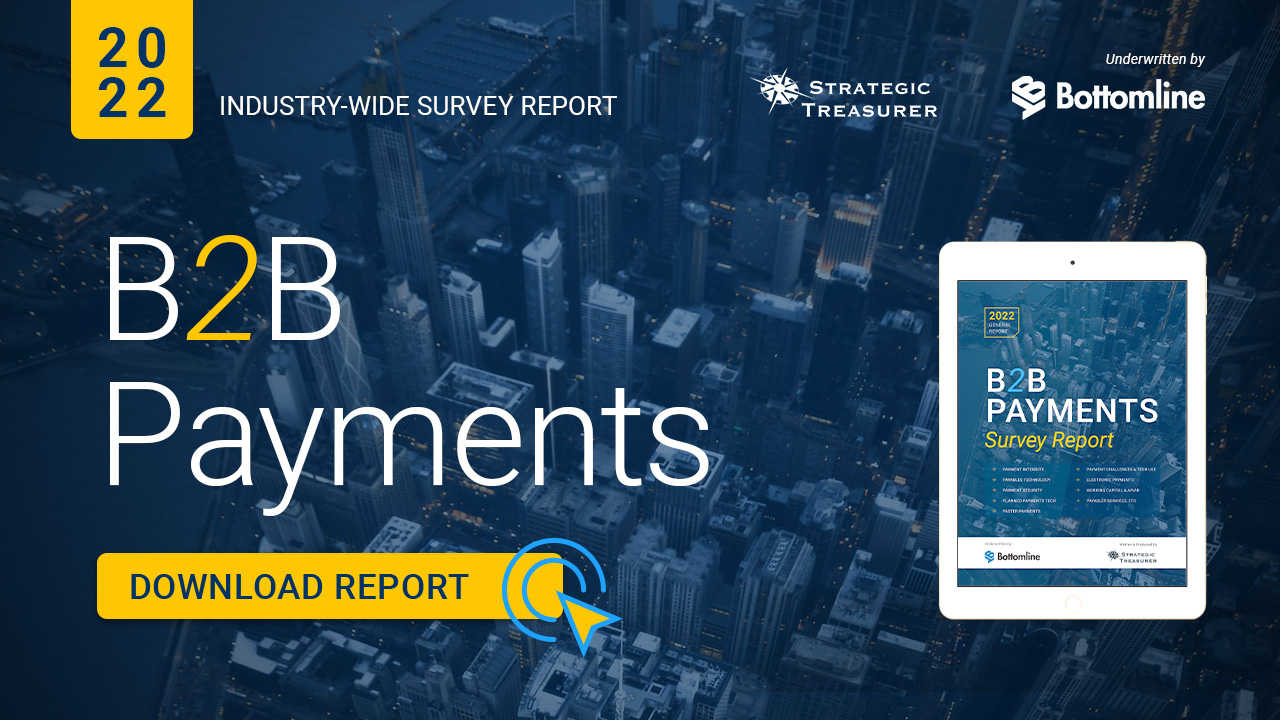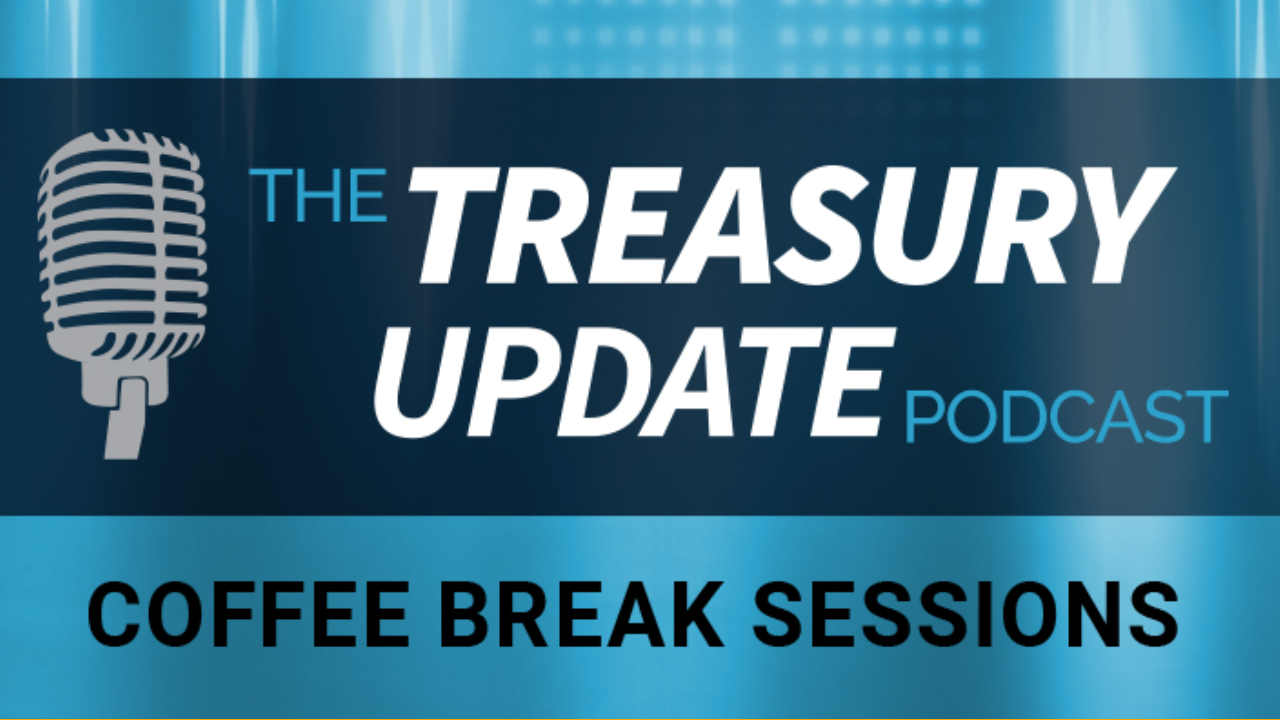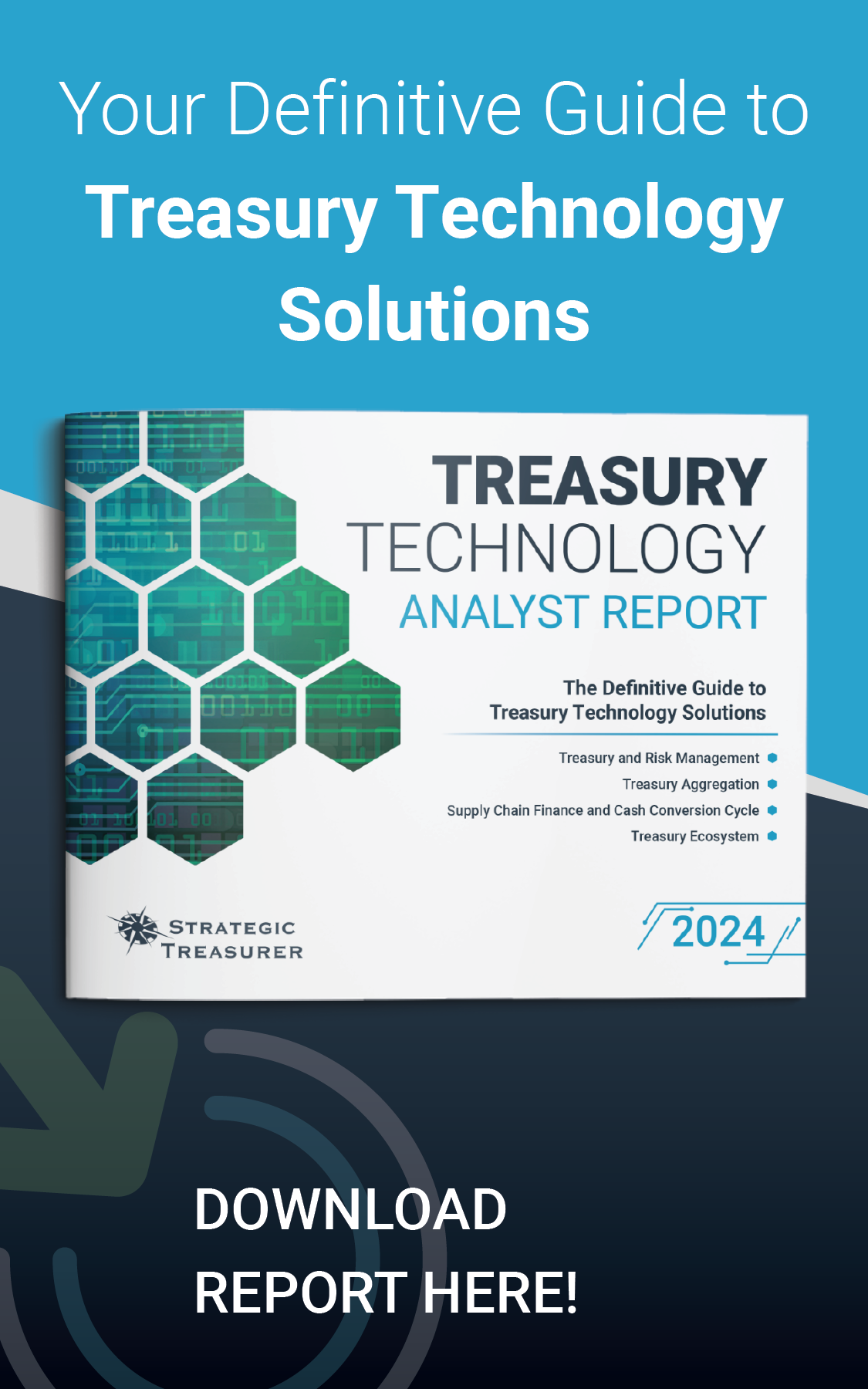
Session 87
Coffee Break Session: What Are Digital Wallets?
Last session, we talked about digital currencies, coins, and tokens. But how are they stored and used? This week, Paul Galloway and Jason Campbell take a look at digital wallets. What are the risks? What are the benefits? How do they work? Listen in to find out!
Host:
Jason Campbell, Strategic Treasurer


Speaker:
Paul Galloway, Strategic Treasurer


Episode Transcription - (Coffee Break Session Series) - Episode 87 - What Are Digital Wallets?
Jason Campbell 00:03
Welcome to the Treasury Update Podcast Coffee Break Sessions presented by Strategic Treasurer covering foundational topics and core treasury issues in about the same amount of time it takes you to drink your cup of coffee. I’ll be your host Jason Campbell business development leader at Strategic Treasurer. Welcome back to another episode of the Coffee Break Session. I’ll be your host Jason Campbell, business development leader here at Strategic Treasurer. Joining me today is our senior adviser Paul Galloway at Strategic Treasurer. Paul, once again, thank you so much for being on the show. We’re pleased to have you on.
Paul Galloway 00:37
Always enjoy this, Jason.
Jason Campbell 00:38
So Paul, we’ve had a really good our last episode of talking about digital currency and and talking about digital coins and tokens and I think our listeners probably grabbed a pretty good, some good nuggets out of there. And hopefully that will bleed into this conversation as we talk about digital wallets, which I think again, digital wallets is kind of a little bit more not just from a business perspective side of things, I think is also to this consumer we find ourselves in plenty of digital wallets and there’s so many options that are out there and available now for folks to kind of utilize and again as I look at things finding ways to be convenience is everything to me and the faster I can get things done the better and being I see a you know that adoptive rate of being digital in my world is there. I love everything digital. So let’s get right into this episode to talk a little bit more about a digital wallets. So what is a digital wallet, Paul?
Paul Galloway 01:33
Digital wallet simply is an application that allows a person to send or receive cash or store cash, make payments, track them on their phone, tablet or computer. Some of the common examples out there are Apple Pay, Google Pay, Pay Pal. So these are all examples of digital wallet, they can hold debit, credit cards, bank account information, they can also hold tickets to events, airline tickets, so they’re literally a wallet that contains all this stuff that you would perhaps put in your pocket.
Jason Campbell 02:07
You and I were talking about this particular subject. And I’m thinking man, if I can only get, there’s a couple more pieces of life that I have to have all the time. And if I was able to incorporate it into my phone, honestly, I would really no need for my physical wallet. Right. And I hate carrying cash. I think you I think you and I were talking about that you’re in the same boat. And I think having a digital wallet is just one of those great things to be able to do. Or how many times I’ve actually left the house and went to a store and then realized I forgot my physical wallet, you know, but then lo and behold, I have my phone, you know, and it just put it next to the payment the credit card machine it would pick up you know and say yeah, you just pay with your phone. And I thought it was just it changed my world the first time ever happened. So I know you described a little bit and gave us some examples of digital wallet. But let’s go into this is kind of a two fold question for you. Kind of explain to us, how does it work? And is it safe?
Paul Galloway 02:59
Yeah, Jason, digital wallets are connected to financial institutions such as bank or credit company, some financial institution that has way to provide, accept cash. People select an app on their phone, laptop, tablet, they set up an account with their payment information, whatever that ends up being, and they can make payments. They can access their digital wallet via their phone, they enter the information and make the payment, hit send, and it’s done. To receive a payment from somebody else, they provide the other person their payment information for that particular app, which is usually tied to like a user ID of some kind. And they make the payment that way. And it comes into your account and your digital wallet. It’s pretty slick. So some of the ways to stay safe with a digital wallet. And I think this is really important. I hope listeners, you know, listen to this list, because it will it will help them. Back in the day wise grown up. As always, you know, hey, you’re carrying cash, because that’s what people usually paid with, when I was growing up was cash. And you always tried to hide it, you didn’t want to whip out a big wad of cash and kind of show it around because that might tell a bad guy, Hey, I’ve got money come and get it. And with a digital wallet, likewise, there’s opportunities for people that want to steal from you, to take it from you. So these things will help prevent that. Well first of all, create a strong password. And you never want to share your password with somebody else. Doesn’t matter who it is. You just don’t want to share it. Don’t give out personal information. Anytime you know you have opportunity where somebody may request information from you, make sure that you’re providing information in a secure way or in a way that others aren’t going to be able to get that information. Use multi factor authentication. I use MFA on all kinds of things. I’ve got all kinds of authenticators, I get emails, I get texts, it’s such an easy way to make to make all the activity that you’re doing via your phone, the web, or otherwise secure. So you’ve got that first layer, your user ID typically, some kind of password, hopefully a strong password that you created. Even though you sign in with that, you have another step you have to take. And what’s unique about multi factor authentication is goes to, it goes to your email that’s personal to you, your phone, that’s personal to you and other people won’t be able to see that. Use your phone security features. Seems simple. Some people may not be aware whether their phone security features are on or not, they need to check into their phone, make sure that they have the security features in place and on. Review your transactions. This is simple. This is something that I practice all the time. I’m always looking at what types of transactions are going through my bank accounts, making sure that they’re my credit cards and make sure those transactions are mine. I’m always looking at them. It’s a simple way to validate that you don’t have something funny going on, in your account. Look out for phishing emails, something that comes in where they’re trying to extract data from you that looks like it’s legitimate, but it’s not, you need to look out for those. Another way is for fraudsters to use social engineering. This is something that is out there between phishing and social engineering. It seems like it’s, it’s pretty common nowadays. So if you have awareness of these types of activities by fraudsters, this will help keep you safe along with the other items I talked about.
Jason Campbell 07:01
So I know we talked about a little bit of, you know, the safety and the features and things to watch out for, you know, making sure you have those authenticators, multifactor authenticators, you know, making sure that the updates are taking care of, because obviously, I know apps, you know, they update, you know, and a lot of times, it’s security updates, right, it’s, it’s something that, hey, there may be some vulnerability here and there. So you got to make sure your phone is updated, got to make sure your apps are updated. I mean, that’s from a consumer perspective, right. But I would imagine in the business world, as we started to see digital wallets also too from that, it’s the same thing, right? Your your laptop, or your your systems, your, your software’s gotta have those updates in place, that’s what’s there for, and making sure those things are set up to ensure that you’re in a safe and secure environment. So now we learned about those things there. What are the risks around digital wallets? Are there any risks?
Paul Galloway 07:49
Here, we kind of talked about some of them around security, you know, making sure you’re not using a single method to sign on, use multifactor authentication. Some of the other risks is that somebody may obtain your data from your phone, or your wearables that are connected to wireless networks. So you need to be cognizant of your phone. If you have your Wi Fi on, is it connecting to something? Is somebody able to come in? Do you have security features in place that help protect your Wi Fi? You know, if you have an unlimited data plan, you may not want to have Wi Fi turned on unless you’re at a place where you know you have secure Wi Fi. So these are things that you can do to help mitigate having somebody get a hold your data from your phone, or your wearable, a watch or something like that. One of the other things is, most people might not realize this. But even though you have a credit card tied to your digital wallet, if there is if you become a victim of fraud in your digital wallet, meaning you pay something out to a bad guy, either a something from through social engineering or phishing, and you ended up paying out to somebody thinking it was something legit, you have little to no recourse associated with that, even though credit cards do you know if you execute a credit card transaction online through a portal like Amazon or something like that, and something was to happen, somebody got a hold of your credit card, started using it to make payment on or buy something on Amazon, you would have some recourse with your credit card company. But with a digital wallet, doesn’t quite work the same. So you just need to be aware of that. If your phone is lost, stolen, or breaks, you will typically lose the information stored in your digital wallet. So so when you think about that, you know some of those risks. These are some of the ones that come to the top of my mind.
Jason Campbell 09:56
Now those are all great examples of definitely some some risk potentials. It’s just about ensuring that, you know, knowing, you know, knowing the proper steps to take to protect yourself, and your your funds or your you know, or your, your transactions, you know, and ensuring that, you know, every step of the way you’re, you’re, you’re validating what’s going on. So talking about what those risks are outside of that, let’s go on the flip side of it. Let’s talk about the benefits. I mean, I mean, to me, I see I see nothing but benefits. But you know, I’d love to get your point of view and educate our listeners a little bit about the benefits that you see.
Paul Galloway 10:29
Yeah, some of the benefits I see are, everything can be stored on your phone, it’s easy to access, you know, you don’t have to carry around debit credit cards on wallet, physically carry them, you have them on your phone. People nowadays, myself included, tend to carry their phones everywhere, right? This is something that people more and more rely on, it’s become a norm. And so having that digital wallet makes it easy to access and carry all the information with you and be able to execute payments. The other thing that I really like and I use this quite often is you can hold tickets to events and airlines and things like that in your digital wallet, I use my phone for concerts and airline tickets all the time. It’s so easy, I love it. I don’t have to mess around with paper, I don’t even have to go to a kiosk, I don’t have to go to a will call. I have to do any of that. I absolutely love that part. I think it’s awesome. One of the other things is that you also have a historical trail of the transactions you complete. So you can go back, you can audit it. Just like your bank account, you can go your digital wallet, you can see all the transactions, identify anything that might be fishy in there, or something that doesn’t look right.
Jason Campbell 11:48
You know, as you’re talking about tickets and things I agree with you 100% I think it’s great. And you know, in a lot of venues, they’re cashless, right? It’s strictly a, a digital form or a credit card or a debit card form. But but they’re cashless I know, like Major League Baseball, you know, like, they have, they don’t issue tickets. Your ticket is your phone. It’s all a digital wallet or a digital app you have to do to access your tickets. So definitely see as that’s, that’s easy for me to as well. I can just show my phone. Boom, there it is, and I’m good to go. So good, all valid points. Well, Paul, thank you again for joining me today. And I really appreciate it. And thank you to our listeners for tuning in to this episode of the Coffee Break Sessions. And if you have any questions, comments or like to provide any feedback, please send us a note podcast@strategictreasurer.com. And until next time, take care.
Announcer 12:42
This podcast is provided for informational purposes only, and statements made by Strategic Treasurer LLC on this podcast are not intended as legal, business, consulting, or tax advice. For more information, visit and bookmark StrategicTreasurer.com.




